Epiphane Zoro Bi Ballo, National Secretary in Charge of Reinforcement of Capacities
Everyone wants good things to happen in life, but people are not sure of the process in which the changes will take place. Epiphane Zoro was a judge from Côte d’Ivoire but received unwanted suffering from political asylum. Then, later on, he returned to his home country as a National Secretary. His life was very dramatic. He did not know how his life would turn out, but he shares his thoughts during the moments of adversity which allowed him to unlock the key to his life.
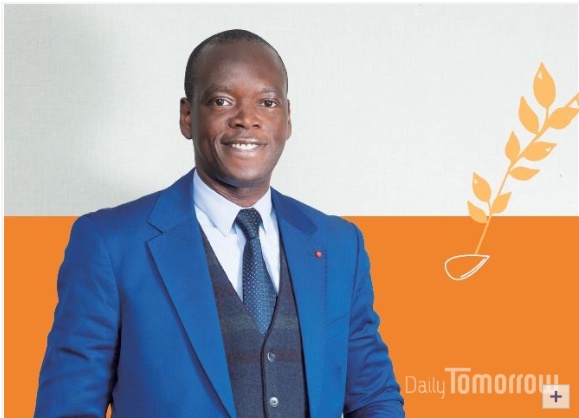
In 1986, about 32 years ago, young Epiphane Zoro had high hopes as he entered law school. At that time, a law school in Côte d’Ivoire, he recalls, was nicknamed “little China.” The school was over populated with students. The lack of seats caused the students to either stand or look through the windows during lecture. The graduation rate was quite low— only 150 graduates for every 1,000 students, so studying hard was a must. Sometimes there was not enough to eat or not enough for bus fares, but those things were never the problem for Epiphane. He only looked forward and strived hard to succeed. Coming from a poor background and having no one to rely on, he had a zeal for studying. That strength became the driving force to keep him focused on his studies.
“After graduating from college, most people get a job, but I wanted to be a judge. I would sleep for only two or three hours a day for a year to pass the bar exam. I reviewed law subjects that I learned from the first year and continually solved various practical problems and common sense problems to prepare the exam. After passing the first test, there was an oral examination. Being poor, I have no nice shirt for the test so I had to borrow someone else's shirt, but I passed the exam.”

Epiphane Zoro passed the bar exam and after two years of training he became a judge. He had a great sense of responsibility to implement justice and make the best judgment for every trial. Even late at night, on his way home, he would ponder upon whether or not his judgment was the indeed the best decision.
“I would read the verdict again even after the trial because the freedom and well-being of people greatly depend on my decision. Sometimes a single decision can lead to the destruction of an individual or an entire family, so the greater the responsibility, the more careful you have to be in making decisions. After the trials, I was not always at ease. Although the criminal who committed the wrongdoing went to prison, the prison system was inhumane, and some of the prisoners died due to the harsh environment. Some of them would die because they could not receive any treatment.
For these reasons, I have been working hard for the future of human rights and also began to live a spiritual life. I felt that the judicial system was not fair. The people were stripped of their liberty so that they would stop committing crime, but what they received was no different than the death sentence. There are verses in the Bible that say, ‘in prison, and did not minister unto thee,’ and ‘I never knew you.’ I was not aware of the people suffering in prison.”
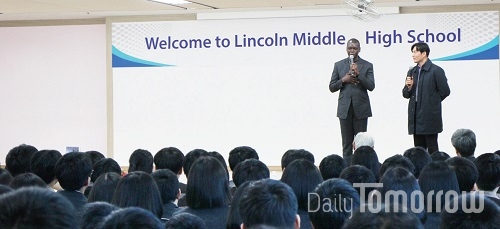
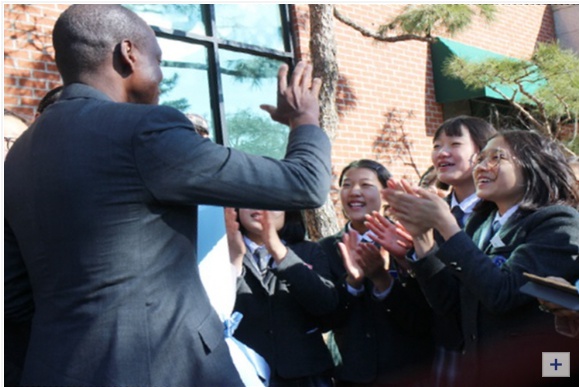
He started visiting prisoners and created an organization to help them. He improved the quality of life of prisoners in prison and assisted in their employment. He gathered people from the city who believed in the same cause and received rice and medicine donations. He started a writing class in prison and gave pens and notebooks to those who could write not to waste their time in prison.
“They looked back at their lives and wrote about it. They wrote about why they were in prison and what they dreamed of. Through the writing, I saw how underprivileged their childhood was and what they hoped for the future. Then I realized that being a criminal was not their own fault but rather the fault of the society. Therefore, I came to the conclusion that it is the duty of the society to help them get back on their feet and become good people. Twenty years have passed, and I still receive letters from the prisoners. This is one of the letters from a past prisoner who is now released.
‘Untill now, people have labeled us as bad people. Yet, you treated us like a friend and gave us the opportunity to look back at our lives and think for ourselves. You gave us hope for a better life.’
One of the serious criminals worked in my house. One day I left for work handing him my house key, and he was amazed by the fact that he had someone who trusted him and that trust allowed him to hope for a new life. I met him last year in the Netherlands, and he became a hard working sports agent for soccer players. I saw a person's life change through a heart to heart connection.”
Epiphane Zoro doesn’t only work for prisoners. He has also helped students from difficult backgrounds get into school and established an orphanage to educate the orphans. Some of the children have grown up to become teachers and some are working on their doctorate degree in History. Many of them still keep in touch with Zoro.
In Côte d’Ivoire, a stable country in West Africa, Epiphane Zoro worked as a judge for five years since 1994. He worked tirelessly for justice, but in 1999 a military coup broke out and he could not continue his work as a judge due to much opposition from the government. As a result, he lived as a refugee in Belgium and Congo Kinshasa for 10 years from the years 2001 to 2011.

Sometimes we feel anxious for knowing our tomorrow. The hardest part of his life, Epiphane Zoro claims, was the time he was in exile. Especially when living in Belgium in 2004, his life was dark and gloomy and his future was in insecure. He barely made a living by doing construction work. As a judge, it was not easy to do hard labor in a foreign country.
“I did many works outside of Côte d’Ivoire. First, in France, we established a group called the Côte d’Ivoire Human Rights Movement and worked to protect human rights. Freedom was not guaranteed in the era of military rule, so the government, the Côte d’Ivoire party, the media, etc., had campaigned for freedom to prevent abuse of power.
When I was in Belgium in 2004, I was so uncertain of my future. I had many thoughts. “Would I ruin all the careers and comfort I’ve worked for over the years because of the values that I’ve asserted?” “Is it right to stick to my values?” or “Is it time to let them go?” After spending days to think, I concluded that I wanted a normal life. “What is the use of studying a lot? What is my dream? What will happen to my future?” I was very disheartened and insecure at that time.”
Once I went to a restaurant for a dishwashing position. They looked at my hands and said, “What could you do with hands that have only worked in the office? You’re not fit for our kitchen.” When I went for an office position they said, “We don’t have anything for an impressive resume like yours.” I was with my family in Belgium, but when I moved to Kinshasa, my family went to England. It was hard to be separated from my family, and my family was in a very difficult situation. This was the most difficult time of my life.”
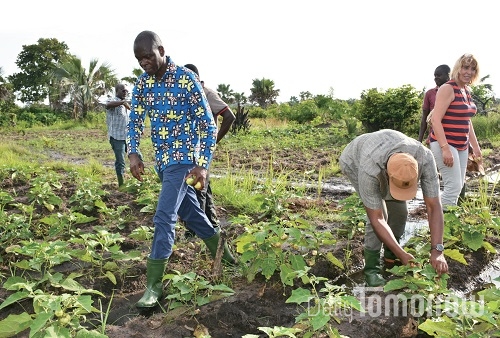
During the time of his exile, Epiphane Zoro had to put down the position of the judge and spent time in agony and anguish. When his circumstances collapsed, he discovered how dreadful the human existence could be. The environment could change at any time, so he pursued the most important value—the essence of life. Fortunately, at the time of his exile in Kinshasa, he was hired by the United Nations to work as a member of the Human Rights Committee to eradicate unjust practices. There was also a military regime in Congo. It was his job to put human rights criminals to trial in Congo. His department also worked closely with the International Court of Human Rights.
Although his career as a judge may have played a role, his experience in the third year of his junior high drama class was the small seed that later led him to focus on human rights. The seed grew and became a big tree with many fruits.
“I was a quiet and introverted child, born as the third child of a thriving family with 13 children. My father was a school teacher who did farm work on the side because his salary as a teacher was not enough to support the family. During the vacation, we also helped father. My father worked hard to send all of his children to school. Therefore, there was no difficulty when it came to eating and basic living. I did very well in elementary school, but it took some time for me to adjust to middle school. Mathematics and Biology were difficult and uninteresting, so I often skipped those classes. The time I spent reading in the library also contributed to my absence in class because once I began to read, I couldn’t stop. Sometimes I would spend an entire day at the library. Naturally, I began to do poorly in the other subjects and in my second year of middle school, my grades were so poor that I got expelled.
In my third year of middle school, I took an acting class that made me speak in front of people and it changed my shy personality. I remember the play I acted in when I was fifteen-years-old. The title was “The Soweto Youth” and it was about racism in South Africa.
“Dear Parents, tonight we will hear the story of the Soweto Youth. He was a young hero who fought against racism. On June 16th, 1976, the streets were filled with 30,000 black people and the police attacked them all. Dozens of people died and thousands more were injured. The thousands of injured people demonstrated the injustice and racism that black people had endured.”
With the start of this opening, the play came to an end. After this play, I felt as if I had actually taken part in fighting the injustice. Through this play my interest for language and literature grew and it also led me to have interest in other subjects such as math, eliminating my difficulties to study.
When I entered high school, I wanted to be a pastor, so I tried to drop out of school my first year. I thought a lot about what life was, and studying philosophy deepened my thoughts. As I read the life and death of Socrates, I believed that there would be something more important than material and thoughts. A friend then gave me the Bible as a gift. As I read the Bible, I began to preach to people. Whether I’m on a bus or meeting people on the streets, I would preach. I was on bad terms with my father for two years as we had different opinions, and my relationship with the rest of my family also wasn’t any better. My father did not oppose me being a pastor, but he said that there were many ways to serve God. He preferred that I serve God as a doctor or lawyer. Of course after the bar exam, my relationship with my father improved again.”
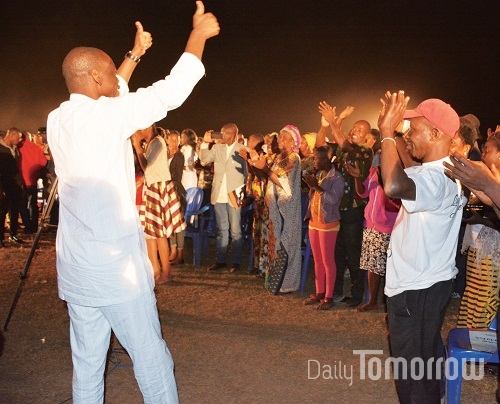
When he was a judge Epiphane Zoro was also a local representative of the Carter Center (founded by former president Jimmy Carter). After his exile, he provided technical assistance to the judicial reform in the Kinshasa branch of the United Nations. He also served as Côte d’Ivoire representative of the French Cooperation Organization. Currently he is the chair of the steering committee of the Francophone Games. In 2016, he was elected to the National Assembly as a parliamentarian, and later became Head of the Office of the Prime Minister’s Office of Education.
“In 2011, the government in power changed and we returned to Côte d’Ivoire. When I returned to my home country, I was in much sorrow because of my emotional heart. Of course I believed that all these difficulties would pass by. At the end there was a purpose in every matter, and I thought that this sacrifice was necessary. Nevertheless, I kept the two coexisting feelings of sorrow and hope in my heart.
Then I began to write. The first book I wrote was titled Juge en Côte d’Ivoire—Desarmer la violence. The book was written based on my experiences in school and as a judge. The second book published was about what I felt during my life in prison and it was very helpful to allude my life to a prison and write about it.”
National Secretary Epiphane Zoro set education and employment as the most urgent problems of Côte d’Ivoire. The country’s 15 years of instability led the youth lose their purpose in life; therefore, it is crucial for the youth to develop an upright personality and form a sense of value as citizens living together in society. Thinking back on his own past experience, he determined that the first thing to do is to help the youth find a healthy goal in their lives. He claimed a great need for “Mind Education” in order to enable students to be self-reliant, independent and accountable in their society. National Secrtary Epiphane Zoro considers “the power of the people” to be the greatest importance in changing a nation, especially changing the mind of the youth.
“Just as a farmer plants his seeds, my efforts in the past have been to plant hope in the hearts of those in despair. Those students whom I’ve met in their youths have now grown and are taking on leadership positions in society. This is what they tell me.
“Mr. Zoro, you are our role model. We want to become just like you.”
It’s rewarding to hear such words, and although I had difficulties in the past, this is the driving force that keeps me going and working hard. Currently, I am working for the Prime Minister’s office, helping people develop skills to become better citizens and influence one another. I believe this movement is an absolute necessity to the development of the country. I am very happy to be in charge of this work.”

